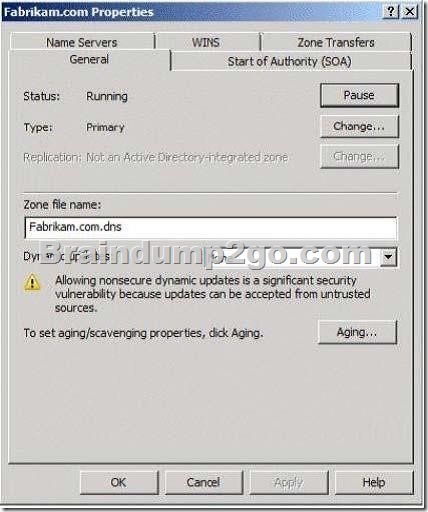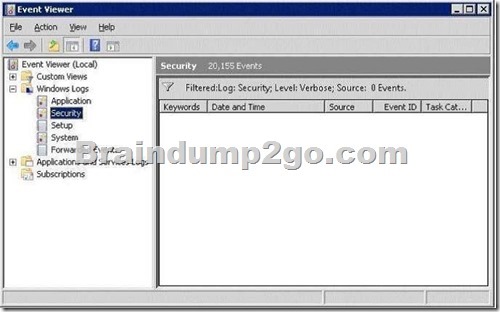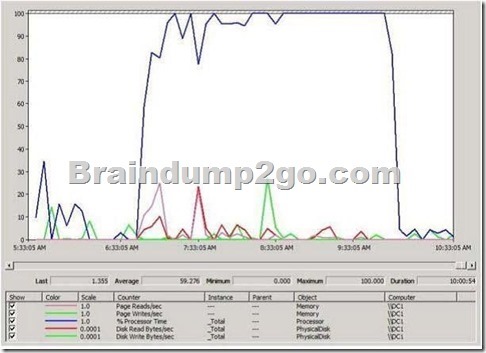2015 Microsoft 70-642 Certification Exam is coming! Getting a Laest 70-642 Practice Test is very important for an Exam Candiate! Braindump2go New Updated 70-642 Exam Questions Well Formatted in PDF and VCE versions, providing you convenience and excellence both at the same time! Free Questions and Answer are provided Following:
Vendor: Microsoft
Exam Code: 70-642
Exam Name: TS: Windows Server 2008 Network Infrastructure, Configuring
Keywords: 70-642 Exam Dumps,70-642 Practice Tests,70-642 Practice Exams,70-642 Exam Questions,70-642 Dumps,70-642 PDF,70-642 VCE,70-642 Study Guide

QUESTION 351
Your network contains a server named Server1 that runs Windows Server 2008 R2.
Server1 has the Network Policy Server (NPS) role service installed.
You need to ensure that the NPS log files on Server1 contain information about the duration of client connections.
What should you do?
A. Enable the Authentication requests setting.
B. Configure the DTS Compliant log file format.
C. Configure the IAS (Legacy) log file format.
D. Enable the Accounting requests setting.
Answer: B
Explanation:
The DTS Compliant log format is the newest one and only its XML have attributes for session duration such as Acct-Session-Time = “The length of time (in seconds) for which the session has been active.
http://technet.microsoft.com/en-us/library/cc771748(v=ws.10).aspx
QUESTION 352
Your network contains a domain controller named DC1.
DC1 hosts a zone named fabhkam.com.
The properties of the zone are shown in the exhibit.(Click the Exhibit button.)
You need to ensure that only secure dynamic updates are accepted for the fabrikam.com zone. What should you do first?

A. Configure the zone to be stored in Active Directory.
B. Change the zone to a secondary zone.
C. Pause the zone.
D. Modify the NTFS permissions of the zone file.
Answer: A
QUESTION 353
Your network contains an Active Directory domain.
The domain contains several VPN servers that run Windows Server 2008 R2.
You need to log the time and the date users establish VPN connections to the network.
The log must be stored in a central location.
What should you configure on the VPN servers?
A. the Windows Accounting accounting provider
B. connection request policies
C. health policies
D. the RADIUS Accounting accounting provider
Answer: D
Explanation:
RADIUS accounting logs information about dial-in connections.
This information is often used for billing purposes.
QUESTION 354
Your network contains a DNS server that runs Windows Server 2008 R2 Service Pack 1 (SP1).
You need to prevent the DNS server from accepting updates for cached resource records until the time-to-live (TTL) value of the cached resource records expires.
Which tool should you use? (Each correct answer presents a complete solution. Choose two.)
A. Server Manager
B. Netsh
C. DNS Manager
D. Regedit
E. Dnscmd
F. Dns
Answer: DE
Explanation:
Open an elevated command prompt.
Type the following command, and then press ENTER:
dnscmd /Config /CacheLockingPercent <percent>
Restart the DNS Server service.
To configure cache locking using the Windows interface
Click Start, click Run, type regedit.exe, and then press ENTER.
In Registry Editor, open HKEY_LOCAL_MACHINE\SYSTEM\CurrentControlSet\services\DNS\Parameters.
If the CacheLockingPercent registry key is not present, right-click Parameters, click New, click DWORD (32-bit) Value, and then type CacheLockingPercent for the name of the new registry key.
Double-click the CacheLockingPercent registry key.
Under Base, choose Decimal, under Value data type a value from 0 to 100 for the cache locking percent, and then click OK.
Close Registry Editor.
Restart the DNS Server service.
http://technet.microsoft.com/en-us/library/ee649148(v=ws.10).aspx
QUESTION 355
A corporate network includes two servers named File1 and File2 that run Windows Server 2008 R2.
You need to ensure that a specific user can schedule Data Collector Sets (DCSs) on File2.
The solution must minimize the number of rights assigned to the user.
What should you do?
A. Add the user to the Performance Log Users group on File2.
B. Assign the Profile single process user right to the user on File2.
C. Assign the Bypass traverse checking user right to the user on File2.
D. Add the user to the Performance Monitor Users group on File2.
Answer: A
QUESTION 356
Your company is implementing Network Access Protection (NAP) with DHCP enforcement.
You need to define which network resources non-compliant client computers can access.
What should you configure?
A. remediation server groups
B. health policies
C. connection request policies
D. system health validators (SHVs)
Answer: A
Explanation:
Remediation server groups are used to specify servers that are available to noncompliant Network Access Protection (NAP) clients for the purpose of remediating their health state to comply with health requirements.
The type of remediation servers that are required depend on your health requirements and network access methods.
http://technet.microsoft.com/en-us/library/dd759158.aspx
QUESTION 357
You need to mount a VHD file that was created by using Windows Server Backup.
Which tool should you use?
A. Storage Explorer
B. Imagex
C. Disk Management
D. Mount
Answer: C
Explanation:
Disk Management – How to Mount and Unmount VHD Images:
http://www.7tutorials.com/disk-management-how-mount-and-unmount-vhd-images
QUESTION 358
Your network contains a server named DC1 that has the DHCP Server server role installed.
Clients located on the same subnet as DC1 are assigned valid IP addresses from DC1.
Clients located on a different subnet are not assigned IP addresses from DC1.
You verify that there is network connectivity between the two subnets.
You need to ensure that the clients on both of the subnets can receive IP addresses from DC1.
What should you do?
A. Authorize DC1 in Active Directory.
B. Increase the database cleanup interval.
C. Configure Routing Information Protocol version 2 (RIPv2) on the router.
D. Configure a DHCP Relay Agent.
E. Restore the database from a backup.
F. Configure name protection.
G. Reconcile the scope.
H. Configure DHCP link layer-based filtering.
I. Modify the start address.
J. Configure Open Shortest Path First (OSPF) on the router.
K. Compact the database.
Answer: D
QUESTION 359
Your network contains a server named Server1 that runs Windows Server 2008 R2 Service Pack 1 (SP1).
You log on to Server1 by using an account named Admin1, and then you open Event Viewer as shown in the exhibit. (Click the Exhibit button.)
You need to ensure that you can view all of the events in the Security log.
What should you do?

A. From the Local Group Policy Editor, set Retain old events to Enabled for the Security log.
B. From a command prompt, run net localgroup /add “Event Log Readers” Admin1.
C. From Event Viewer, right-click Security, and then click Refresh.
D. From the Local Group Policy Editor, set Log access to Enabled for the Security log.
E. From Event Viewer, right-click Security, and then click Clear Filter.
Answer: E
QUESTION 360
Your network contains a server named Server1 that runs Windows Server 2008 R2 Service Pack 1 (SP1).
Server1 has Microsoft SQL Server 2008 R2 and the File Services server role installed.
Users report that access to Server1 during the morning is very slow.
An administrator creates a Data Collector Set and provides the results shown in the exhibit. (Click the Exhibit button.)
You need to log the CPU utilization of the processes running on Server1 if the CPU utilization exceeds 85 percent for more than one minute.
What should you do? (Each correct answer presents part of the solution. Choose two.)

A. Configure an action on the performance alert to run the systempropertiesperformance.exe
command.
B. Configure a trigger on the performance alert to start the System Performance Data Collector
Set.
C. Enable the SQMLogger event trace session.
D. Create a scheduled task that runs the Get-PSProvider cmdlet.
E. Create a Data Collector Set that has a performance alert for \Processor (_Total)\%Processor
Time.
Answer: BE
2015 Latest Released Microsoft 70-642 Exam Dumps Free Download From Braindump2go Now! All Questions and Answers are chcked again by Braindump2go Experts Team, 100% Real Questions and Correct Answers Guaranteed! Full Money Back Guarantee Show our Confidence in helping you have a 100% Success of Exam 70-642! Just have a try!


